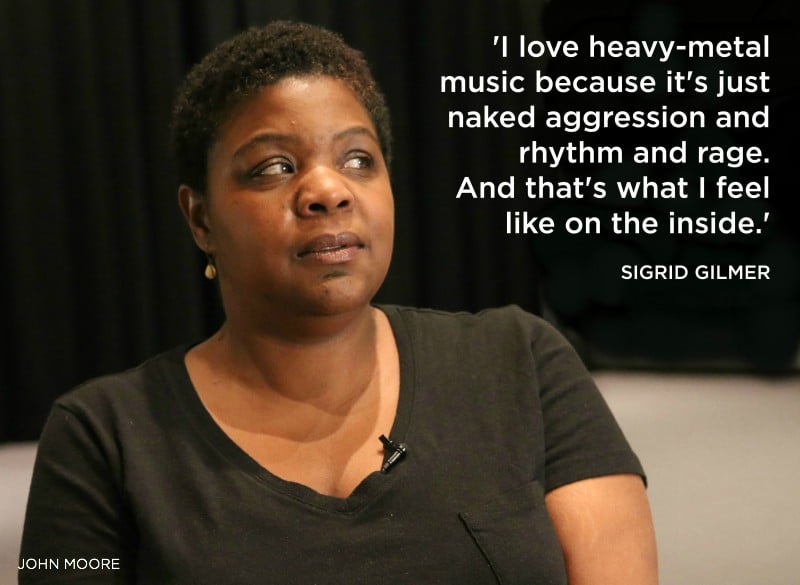DCPA NEWS CENTER
Enjoy the best stories and perspectives from the theatre world today.
Enjoy the best stories and perspectives from the theatre world today.
This article was published on February 20, 2018
Video by DCPA Video Producer David Lenk and Senior Arts Journalist John Moore.
In this daily, four-part series for the DCPA NewsCenter, we will introduce you to the plays and playwrights featured at the Denver Center’s 2018 Colorado New Play Summit. Over the past 13 years, 29 plays introduced at the Summit have gone to be premiered on the DCPA Theatre Company mainstage season. First up: Sigrid Gilmer of San Francisco, author of Mama Metallica.
John Moore: What happens in your play?
Sigrid Gilmer: A woman named Sterling Milburn has a mother with dementia and she’s coping with the grief of that through her muse: The heavy-metal band Metallica.
John Moore: So why Metallica?
Sigrid Gilmer: The play really is a love letter to my mom, to Metallica, and to the theater, which were the three biggest influences on me growing up.
John Moore: Let’s go through those. First, tell us a little bit about your mom.
Sigrid Gilmer: My mom right now suffers from dementia, but she obviously didn’t for most of my life. She was a single mom, so a lot of it was just the two of us hanging out. We used to travel, and she cooked a lot. It was a good childhood. But and like all mother-daughter relationships, it was complicated, and I have had to kind of negotiate and reconcile that. The play is really me grieving somebody who’s still alive.
John Moore: Is it possible that you’ve managed to write a play about dementia that’s actually funny?
Sigrid Gilmer: Oh, it’s super funny. I mean, what makes you laugh will make you cry, right? I think that whatever that edge of crying and laughing is, that openness, I feel like they’re in the same emotional neighborhood.

‘Mama Metallica’ cast member Lee Sherman. Photo by Adams VisCom.
John Moore: Why do you love heavy-metal music?
Sigrid Gilmer: Because it’s just naked aggression and rhythm and rage. And that’s what I feel like on the inside.
John Moore: How does Metallica help you deal with what’s going on with your mom?
Sigrid Gilmer: I discovered Metallica in my sophomore year of high school. I was listening to the college radio station after school one day when they played the song “Master of Puppets,” and it just blew my mind. It’s a very long song about how addiction is the puppet master. It’s amazing. It’s orchestral. We had this giant stereo system and I remember leaning against these really huge, tall speakers. It was cranked up, and my mind was just blown.
John Moore: And how is your play a love letter to theatre?
Sigrid Gilmer: I have been doing theater since I was 9, so I haven’t really haven’t done anything else with my life. My play is a salute to the mid-century autobiographical plays like The Glass Menagerie by Tennessee Williams, anything by Arthur Miller. Those are the first plays I ever encountered, and they are so well-made. I felt like Mama Metallica is my homage to that kind of play.

Photo by John Moore.
John Moore: So, when I hear your mother, Metallica, and mid-20th-century playwrights … they sound like three different plays. How do they work all together in one?
Sigrid Gilmer: Well, they’re three different things, but they’re all filtered through me, so it becomes one thing. They’re thrown together and spliced together and smashed up against each other, and I think it makes an interesting kaleidoscope. Some of the dissidence is really quite beautiful and fun. It’s a cacophony, like a good heavy-metal jam. If you listen to any really good Metallica song like “Master of Puppets” or “Disposable Heroes,” they’re long and complicated and they have different melodies and strains and rhythms running throughout them. And at some point, it all coalesces into this magnificent tapestry of sound.

‘Mama Metallica’ rehearsal. Photo by John Moore.
John Moore: So tell us about some of the famous characters you have written into your story.
Sigrid Gilmer: Tennessee Williams is in it, and Eugene O’Neill, and Metallica.
John Moore: They were all available?
Sigrid Gilmer: They were all available — and they all wanted to be in it.
John Moore: This is what you do in a lot of your plays. You worked Duran Duran into one of your plays, Axiom.
Sigrid Gilmer: Oh, yeah! That play is about how a Duran Duran song sparks a student-worker riot in a factory. I find that pop culture is a really good way of anchoring emotion. Especially pop music, because it’s always in the background as you’re living your life.
John Moore: How did it ever occur to you to re-imagine Harriet Tubman as an action star in your play Harry and the Thief?
Sigrid Gilmer: Oh, my God, it’s so easy. I read this one anecdote about Harriet Tubman and it was that she kept a gun with her when she ferried people to the north. And when people would freak out, she would turn to them, pull the gun out and say, “You’re going to be free or you’re going to be dead.” And I was like, “That is the best action-movie line ever.” I thought, “Where is the Michael Bay production of this story?” It was kick-ass.
John Moore: Is it true that your playwriting career started with you taking a class in college?
Sigrid Gilmer: Oh yes, and coincidentally, the writer of (The DCPA Theatre company’s current world premiere) American Mariachi, José Cruz González, was that playwriting instructor. I think the value of taking a playwriting class is the ability to shape a world for yourself and to be able to tell whatever story you want. And to to actually know how to construct a story for the stage is powerful.
John Moore: What would you think if someone tried to tell you that there are rules of playwriting that you should follow?
Sigrid Gilmer: If somebody were to tell me there’s one certain way to write a play, I would be thinking mean things — but I would be polite. There’s no one way to tell a story. There are as many people in the world as there are ways to tell a story. Everyone has their certain way of viewing the world and negotiating and navigating that world. I mean there are certain devices and narrative structures that are helpful to know, but I think those are negotiable.
John Moore: When did you find your own voice and know this is what you wanted to do?

Jose Cruz Gonzalez
Sigrid Gilmer: It was actually taking that first playwriting class with Jose. I had always known that I wanted to be in theater. I did theater, acting and directing as an undergrad until I realized that, as a black woman, there weren’t going to be as many choice roles for me. Nobody was going to hand me Othello or let me play Iago — which I think is probably the best character ever created. I was really thinking of leaving theater altogether before I took that playwriting class. And when I wrote my first play, I knew this is where I belong in the theater. I got to play all the roles. I got to be everybody and make everything happen. That’s an amazing feeling.
John Moore: What are your initial thoughts on your first Colorado New Play Summit?
Sigrid Gilmer: For me, having that second week allows the work we’re doing in the first week to be less precious. We can be risky. We can take more chances knowing that if something doesn’t work, we have another week to tweak it and put it back up on its feet. Having a process that’s less geared toward presentation frees me up as a playwright. I think it also frees up the actors and the directors to be adventurous and find the beauty that can come out of a mess or an accident or by being haphazard. It doesn’t have to be perfect, which means there’s more freedom and more breathing room. And when we try something out in front of an audience, and if it doesn’t work we can just sweep that under the rug. Nobody has to know.
John Moore: What would it mean to you if, one day, Metallica was in the audience watching this?
Sigrid Gilmer: Oh, my God. It would just be crazy amazing. In the fantasy production in my head, Metallica’s playing onstage — but it is Metallica in 1987. Dear Metallica, if you’re reading this, come and be in my play.
Mama Metallica: Cast list
Written by Sigrid Gilmer
Directed by Jaki Bradley
Dramaturgy by Ricardo A. Bracho
Stage Manager: Dana Reiland
Stage Management Apprentice: Molly Langeberg

Photo by John Moore

Leave a Reply
Want to join the discussion?Feel free to contribute!